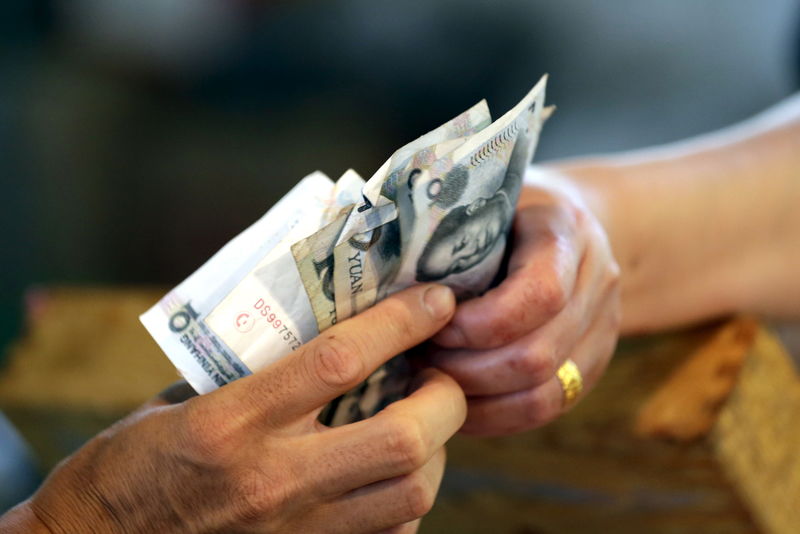By Winni Zhou and John Ruwitch
SHANGHAI (Reuters) - As China's yuan slips to historically weak levels against the dollar, the central bank's atypical light touch is spurring speculation that policymakers want to be more judicious in their intervention and have no specific target for the currency.
The yuan has lost more than 2.5% against the dollar since the festering China-U.S. trade dispute took a turn for the worse with tariff increases early this month. It is now less than 0.1 yuan away from the 7-per-dollar level authorities have in the past indicated as a floor.
A weakening yuan risks sparking outflows, a major concern for policymakers keen to retain investor confidence in a slowing economy and acrimonious trade war with the United States.
But the People's Bank of China (PBOC) has done little to keep the yuan in check, beyond issuing yuan-denominated bills in Hong Kong and setting the managed currency's daily mid-point consistently stronger than market expectations.
"My sense is that 7 is no longer so critical as in 2016. Policymakers are more confident," said Tommy Xie, head of Greater China research at OCBC Bank in Singapore. "It also depends on the cost of defending 7."
In 2015, a one-off 2% yuan devaluation fuelled depreciation expectations, and Beijing burned through about $1 trillion (789 billion pounds) of foreign exchange reserves to fight back.
In 2018, to hold the currency steady, the PBOC raised the cost of shorting the yuan by hiking reserve requirements on forwards. State-owned banks also used swaps and sold dollars to prop up the local unit.
Despite the trade war, it was not until this week that senior central bank officials launched a verbal campaign to remind the market that China can keep the yuan "basically stable" and draw on a toolbox of policies to manage fluctuations.
"Nothing has gone wrong, and (we) will not allow anything to go wrong," Liu Guoqiang, PBOC vice governor, told the Financial News, a newspaper run by the central bank.
The PBOC did not respond immediately to faxed questions from Reuters about its policy and tactics relating to yuan levels.
(For graphic on China's falling yuan approaches 7/dollar, click https://tmsnrt.rs/2W6Aoqb)
SUBTLE MESSAGE
To yuan watchers, the central bank's perfunctory actions and messaging suggest a higher degree of comfort with a weaker yuan, while the currency's stability against a basket of trade-weighted currencies is evidence it is not encouraging excess depreciation.
"The authorities are providing only the support needed to cap yuan weakness, rather than trying to strengthen the currency significantly," Lemon Zhang, a strategist at Standard Chartered (LON:STAN) Bank wrote in a note.
A weaker yuan would theoretically help exporters, many of whom are feeling the pinch of U.S. tariffs on billions of dollars worth of made-in-China goods.
BofAML analysts Claudio Piron and Ronald Man reckon China will limit the yuan's weakness in the run-up to a G20 summit at the end of June, when U.S. President Donald Trump and his Chinese counterpart Xi Jinping might meet.
If that meeting fails to produce a breakthrough easing trade tensions, "it is clear that China has the capacity and need for yuan depreciation to dollar/yuan 7.13. Fiscal stimulus and monetary easing would be required to support China's economy," they said.
But analysts suspect the PBOC's strategy is not just about targeting yuan levels but also involves managing its currency reserves and a growing international role for the yuan. Those explain the central bank's reluctance to reduce its dollar reserves too quickly or drive up interest rates in the offshore yuan market in order to make it expensive to short-sell the currency.
"If the central bank chooses to intervene directly in the market, a decline in the reserves to $2.9 trillion from $3 trillion would trigger greater shock to market confidence," said Raymond Yeung, ANZ'S chief Greater China economist in Hong Kong.
Yeung says the PBOC "is unwilling to see a huge gap between onshore and offshore yuan as that would affect international institutions' judgment of whether the yuan is capable as a reserve currency".
The offshore yuan this week has been relatively weaker than the onshore one, but the PBOC's sale of its debt in Hong Kong, intended to drain offshore yuan supplies, has been small scale.

As the central bank juggles multiple objectives, its injections of cash onshore, aimed at spurring lending in a slowing economy, have also been modest, in part to guard the exchange rate.